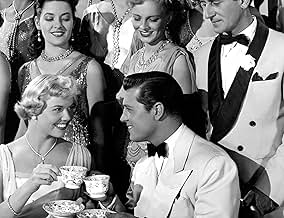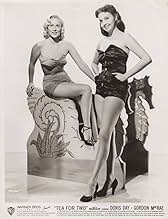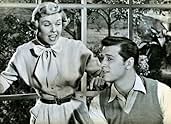IMDb RATING
6.5/10
2.3K
YOUR RATING
A socialite with aspirations of a career in show business bets her wealthy uncle $25,000 that she can say "no" to everything for two days straight, hoping winning will help her fulfill her d... Read allA socialite with aspirations of a career in show business bets her wealthy uncle $25,000 that she can say "no" to everything for two days straight, hoping winning will help her fulfill her dreams.A socialite with aspirations of a career in show business bets her wealthy uncle $25,000 that she can say "no" to everything for two days straight, hoping winning will help her fulfill her dreams.
- Awards
- 1 win total
Patrice Wymore
- Beatrice Darcy
- (as Pat Wymore)
George Baxter
- Mr. Woltz - Show Backer
- (uncredited)
Jack Boyle Jr.
- Chorus Boy
- (uncredited)
Tex Brodus
- Chorus Boy
- (uncredited)
Jack Colton
- Chorus Boy
- (uncredited)
Carol Coombs
- Friend of Lynne & Richard
- (uncredited)
Jack Daley
- Truck Driver
- (uncredited)
Herschel Daugherty
- Theatre Manager
- (uncredited)
Abe Dinovitch
- Taxi Driver
- (uncredited)
Elinor Donahue
- Lynne Smith
- (uncredited)
Featured reviews
This very early Doris Day effort is a re-working of the stage show, "No, No, Nanette!". In order to get her chance to appear in a musical, Nanette has to promise to say 'no', for a prescribed period of time, to everything that is asked of her.
Set notionally in 1929, the period of the original show, but barely even attempting historical accuracy, the film is really only a vehicle for Doris, Warners' new star. So little regard is had to period feel that Doris performs one number in a New Look dress. Soft-focus close-ups and jerky dialogue trundle the action from one musical set piece to the next.
The opening number in the rehearsal room is well-presented, with an attractive New York cityscape beyond the window and a nice 'infinite regression' effect in the wall mirrors. Doris sings and dances appealingly throughout, especially in "Crazy Rhythm" (in which Gene Nelson has a terrific athletic dance solo).
Gordon MacRae as Tommy gives us his usual thoroughly dependable (if uninspiring) male lead, and Patrice Wymore does her customary 'beautiful bad girl' as Bea Darcy. Pauline the wise-cracking secretary is played by Eve Arden (27 years later, the principal of Rydell High in "Grease"). The 'Charleston' sequence is a knockout, and Gene Nelson's bannister dance in "Oh Me, Oh My!" is astonishingly good. The character of Mabel Wylie (Virginia Gibson) is introduced, but then not persevered with, suggesting that some plot sections were later edited out.
Verdict - A pleasant Doris vehicle with songs cleverly embedded in a so-so plot.
Set notionally in 1929, the period of the original show, but barely even attempting historical accuracy, the film is really only a vehicle for Doris, Warners' new star. So little regard is had to period feel that Doris performs one number in a New Look dress. Soft-focus close-ups and jerky dialogue trundle the action from one musical set piece to the next.
The opening number in the rehearsal room is well-presented, with an attractive New York cityscape beyond the window and a nice 'infinite regression' effect in the wall mirrors. Doris sings and dances appealingly throughout, especially in "Crazy Rhythm" (in which Gene Nelson has a terrific athletic dance solo).
Gordon MacRae as Tommy gives us his usual thoroughly dependable (if uninspiring) male lead, and Patrice Wymore does her customary 'beautiful bad girl' as Bea Darcy. Pauline the wise-cracking secretary is played by Eve Arden (27 years later, the principal of Rydell High in "Grease"). The 'Charleston' sequence is a knockout, and Gene Nelson's bannister dance in "Oh Me, Oh My!" is astonishingly good. The character of Mabel Wylie (Virginia Gibson) is introduced, but then not persevered with, suggesting that some plot sections were later edited out.
Verdict - A pleasant Doris vehicle with songs cleverly embedded in a so-so plot.
Doris and Gordon have delightful musical chemistry but this cobbled together backstage comedy (that has nothing to do with "No No Nanette") is kind of a dud. Both stars fare much better in the charming "On Moonlight Bay."
Despite a few spirited dance numbers, and the energetic (if light on charisma) Gene Nelson, it feels like all the A-List musical talent was locked up over at MGM.
The reliable Eve Arden is given some C-list wisecracks, SK Sakall tries his best with his trademark adorable apoplexy, but much of the comedy unfortunately falls into the less than capable hands of Billy DeWolfe.
Despite a few spirited dance numbers, and the energetic (if light on charisma) Gene Nelson, it feels like all the A-List musical talent was locked up over at MGM.
The reliable Eve Arden is given some C-list wisecracks, SK Sakall tries his best with his trademark adorable apoplexy, but much of the comedy unfortunately falls into the less than capable hands of Billy DeWolfe.
DORIS DAY and GORDON MacRAE are a pleasant team again in TEA FOR TWO, this time given some nifty song and dance routines and a supporting cast of old pros--Gene Nelson, Eve Arden, S.Z. Sakall, Patrice Wymore, and Billy deWolfe. The fluffy plot has Day promising Sakall that she'll say "no" to any question posed over the week-end, but is only an excuse for some wonderful old-time songs and some talented dancing by Day and Gene Nelson.
Day proves what a fine vocalist she is--and Gordon MacRae proves he's no slouch with his pleasant baritone voice. Gene Nelson does some fancy footwork and there are comic highlights with Eve Arden tossing off one-liners with her usual skill and Billy deWolfe reminding us what a wonderful comedian he could be with the right material.
Pleasant, above average entertainment, well worthwhile if you like these kind of fluffy musicals.
Day proves what a fine vocalist she is--and Gordon MacRae proves he's no slouch with his pleasant baritone voice. Gene Nelson does some fancy footwork and there are comic highlights with Eve Arden tossing off one-liners with her usual skill and Billy deWolfe reminding us what a wonderful comedian he could be with the right material.
Pleasant, above average entertainment, well worthwhile if you like these kind of fluffy musicals.
Since I was a child old movies made my day when they were on the television....Long before video tape machines. Nothing, in my mind, can replace any old movie. Black & white or Technicolour, they are done with class and taste. Now, anything goes. That is a shame. Enjoy this movie. Especially, the actor who plays Doris' uncle. Can' remember his name just now.
Pillow Talk is another Doris Day film I would suggest. Her acting is so wonderful to watch. I have yet to see her act the same way in any movie I have had the pleasure to see. She is one of a kind. Her smile, her singing: Amazing!
Pillow Talk is another Doris Day film I would suggest. Her acting is so wonderful to watch. I have yet to see her act the same way in any movie I have had the pleasure to see. She is one of a kind. Her smile, her singing: Amazing!
Tea for Two (David Butler, 1950) - I like Doris Day, but her cheery singing and cartoonish sensibility can't save this average musical, which is hamstrung by excessive comic relief, an unsuitable setting (the onset of the Great Depression - what an amusing scenario) and characters it's very difficult to root for. The set-up is this: Day dreams of being a Broadway star, and will get her big break if she can win a bet with uncle S.Z. Sakall to say "no" to every question she's asked for 36 hours. Not only do the writers fail to mine this promising premise to convincing dramatic ends, but they hardly wring any laughs out of it either. It's left instead for Billy "Oh no, not Billy De Wolfe" De Wolfe to provide the comic relief, which is not a situation I would like to revisit any time soon.
The lack of thought that went into the script is epitomised by the staggeringly artless way a gaggle of fun late-'20s songs are crowbarred into the narrative. Still, the film is lit by that good score, much of it performed by frequent co-stars Day and Gordon McRae, and some impressive hoofing from Gene Nelson - with his staircase dance the obvious high spot. Terence Davies' favourite character actress, Eve Arden, snipes agreeably in support. Tea for Two is based on the stage musical No, No, Nanette (filmed in 1930 and 1940), which is the show-within-a-film here.
The lack of thought that went into the script is epitomised by the staggeringly artless way a gaggle of fun late-'20s songs are crowbarred into the narrative. Still, the film is lit by that good score, much of it performed by frequent co-stars Day and Gordon McRae, and some impressive hoofing from Gene Nelson - with his staircase dance the obvious high spot. Terence Davies' favourite character actress, Eve Arden, snipes agreeably in support. Tea for Two is based on the stage musical No, No, Nanette (filmed in 1930 and 1940), which is the show-within-a-film here.
Did you know
- TriviaThis is the first of five collaborations between Doris Day and Gordon MacRae. They would later co-star in Les Cadets de West Point (1950), Le bal du printemps (1951), La ronde des étoiles (1951), and La maîtresse de papa (1953).
- GoofsIn the 1950 "bookend" scenes, the kids make much of the 1920's raccoon coat and flapper dress they found. In the bulk of the film, set in 1929, no characters wear "Roaring Twenties" clothing.
- Quotes
William 'Moe' Early: I made a fortune today. I sold short.
J. Maxwell Bloomhaus: Who did you sell short to?
William 'Moe' Early: You!
- Crazy creditsThe writing credit card originally read: Screen Play by Harry Clork, and the smudged out credit read: Suggested by the play "No, No, Nanette," by Frank Mandel, Otto Harbach, Vincent Youmans and Emil Nyitray.
Notably missing is the name of lyricist Irving Caesar, who was a co-lyricist of the original Broadway score of "No, No, Nanette." Yet receiving credit are Frank Mandel and Emil Nyitray, who actually wrote the play "My Lady Friends," on which the libretto of "Nanette" was based.
Apparently, there was a subsequent dispute involving these credits, the details of which remain obscure, but as part of the settlement of the matter, Warners agreed to blur the source credits on all future prints of the film (which now includes video, DVD, Blu-ray and cable TV versions).
- ConnectionsFeatured in Biography: Doris Day: It's Magic (1998)
- SoundtracksCharleston
Lyrics by Cecil Mack
Music by James P. Johnson (as Jimmy Johnson)
Danced by Billy De Wolfe and cast
Played at the Westchester estate
- How long is Tea for Two?Powered by Alexa
Details
- Runtime1 hour 38 minutes
- Aspect ratio
- 1.37 : 1
Contribute to this page
Suggest an edit or add missing content

































